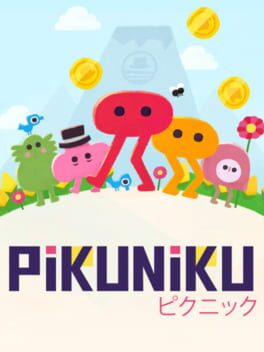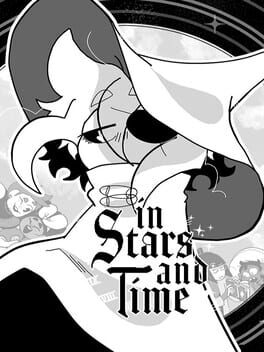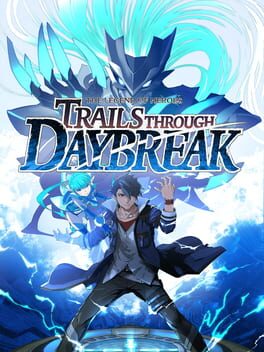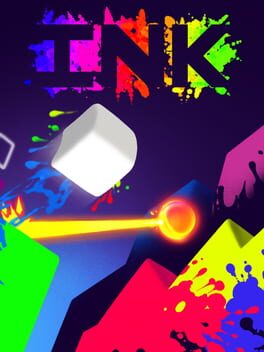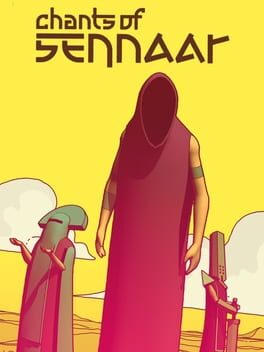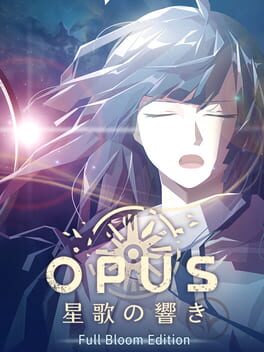inaytaobako
2019
Charming, bite-sized fun. Best played with kids.
Piku himself, like a blob, is a meaningless avatar and could be replaced with a cursor. In terms of the story, the enjoyment revolves around the cast of characters you meet. The NPCs are charming and frequently funny in a dry, "joke relatable to adults but will fly over kids' heads" kind of way. The closest comparison I can think of is Donut County, an excellent short game.
It's unfortunate then that unlike Donut County, I found the gameplay loop of Pikuniku extremely dull. Donut County was kinda stupid, but at least nom-ming everything with a hole speaks to a nice primal part of the brain. Here, walking around isn't inherently fun. The platforming wasn't challenging enough, and the floaty controls which are charming in the overworld turned out to be a detriment. The puzzles were way on the easier side. Was kinda bored most of the time.
And I acknowledge that this is a me thing rather than the game itself. I mean, it's still cute. But if I wasn't playing this with my kid, I would have dropped it way before the end of the game.
Piku himself, like a blob, is a meaningless avatar and could be replaced with a cursor. In terms of the story, the enjoyment revolves around the cast of characters you meet. The NPCs are charming and frequently funny in a dry, "joke relatable to adults but will fly over kids' heads" kind of way. The closest comparison I can think of is Donut County, an excellent short game.
It's unfortunate then that unlike Donut County, I found the gameplay loop of Pikuniku extremely dull. Donut County was kinda stupid, but at least nom-ming everything with a hole speaks to a nice primal part of the brain. Here, walking around isn't inherently fun. The platforming wasn't challenging enough, and the floaty controls which are charming in the overworld turned out to be a detriment. The puzzles were way on the easier side. Was kinda bored most of the time.
And I acknowledge that this is a me thing rather than the game itself. I mean, it's still cute. But if I wasn't playing this with my kid, I would have dropped it way before the end of the game.
2023
Oh stars, I did not expect to like this game as much as I did. This is in no way a perfect game, but any deficiencies were overridden with the game's two best qualities - excellent writing and absolute earnestness.
The characters were written superbly, and the game did a good job making you like every one of them within the
first half hour or so. Despite each of them having the potential to come off as juvenile, the absolute innocence of their actions propelled them from 'overacting' to 'extremely loveable'. What helped here was the slightly off-kilter way the world was introduced, with a lot of knowing nods to traditional JRPG tropes. (I mean, their RPS elemental triangle is literally rock-paper-scissors). You're just expected to accept the world and it characters as they're presented, and it won me over.
Let it be said that the game falls under what I would affectionately call...tumblrcore. Vaugarde and the Change religion both seem like the queer utopia. Many aspects of world-building seem like scraps from other fiction thought experiments, and you hear the author silently mouthing wouldn't it be nice if the world was like this, wink wink? I'm sure some people would see this and immediately nope out, but it honestly wasn't an issue for me as tumblr-ness was never really placed front and center of the narrative. The challenges and growth that our protagonists experience are universal. Sif, Odile, Isa, Mira, and Bonnie's problems could be anyone's story. And by Change, the game ends on such a high note that you want to hug every single one of those idiots.
And wow, what a story. I laughed, I was scared, I was frustrated. All at the planned points too, I believe. The author is excellent at ludonarrative synchrony, leveraging gameplay to reflect and parallel what you and the protagonist are feeling. Siffrin's happy? So are you. Siffrin wants to crabbing end it all? Yeah I wanted to throw the steam deck down at times as well.
And... yeah, maybe that last point got a bit too much at times. If there's just one criticism, I think the game is slightly longer than it should be. Despite the QOL improvements, there are some parts starting the second half of the game where I felt like the gameplay could be tightened up while retaining the same message.
So yeah. Imperfect game, but one that hit me hard and I'll bet I'll be thinking about for a while.
The characters were written superbly, and the game did a good job making you like every one of them within the
first half hour or so. Despite each of them having the potential to come off as juvenile, the absolute innocence of their actions propelled them from 'overacting' to 'extremely loveable'. What helped here was the slightly off-kilter way the world was introduced, with a lot of knowing nods to traditional JRPG tropes. (I mean, their RPS elemental triangle is literally rock-paper-scissors). You're just expected to accept the world and it characters as they're presented, and it won me over.
Let it be said that the game falls under what I would affectionately call...tumblrcore. Vaugarde and the Change religion both seem like the queer utopia. Many aspects of world-building seem like scraps from other fiction thought experiments, and you hear the author silently mouthing wouldn't it be nice if the world was like this, wink wink? I'm sure some people would see this and immediately nope out, but it honestly wasn't an issue for me as tumblr-ness was never really placed front and center of the narrative. The challenges and growth that our protagonists experience are universal. Sif, Odile, Isa, Mira, and Bonnie's problems could be anyone's story. And by Change, the game ends on such a high note that you want to hug every single one of those idiots.
And wow, what a story. I laughed, I was scared, I was frustrated. All at the planned points too, I believe. The author is excellent at ludonarrative synchrony, leveraging gameplay to reflect and parallel what you and the protagonist are feeling. Siffrin's happy? So are you. Siffrin wants to crabbing end it all? Yeah I wanted to throw the steam deck down at times as well.
And... yeah, maybe that last point got a bit too much at times. If there's just one criticism, I think the game is slightly longer than it should be. Despite the QOL improvements, there are some parts starting the second half of the game where I felt like the gameplay could be tightened up while retaining the same message.
So yeah. Imperfect game, but one that hit me hard and I'll bet I'll be thinking about for a while.
The game isn't perfect, but the 5 rating reflects on overall enjoyment while finishing the game, as well as its position for someone who has played the entire Trails series.
A great protagonist, endearing party members (especially the first three you get + Judith) and a lot of heart elevate the characters to a surprising level, given this is the first game of an arc. There were slight cracks toward the end as more party members joined, with chapter 5 getting the annoying Falcom "let's all stand behind the main character and utter a single line of agreement" and "AS A JAEGER/ENGINEER/ACTRESS, I THINK..." bullshit.
The narrative's darker tone shines, especially coming from Cold Steel's power-of-heart speeches. Even the side quests are all generally meaningful from a character development or narrative perspective, instead of the usual fetch quest crap.
The story within the individual chapters are interesting, though I can't say as much for the thread binding everything together. I felt the over-arching narrative relies a bit too much on hand-wavey magitek miracle stuff, though the villains are deliciously evil.
The battle system is great though unbalanced. Shard skills are interesting but there are only few of them, and it becomes quite clear early on that some are stronger than the others. The result, of course, is a typical easily-broken Falcom game, Even on nightmare, only the boss fights required a bit of thinking, and not even all of them.
All these weaknesses do not take away from the highs of the game though, and I had an absolutely enjoyable time with the game.
A great protagonist, endearing party members (especially the first three you get + Judith) and a lot of heart elevate the characters to a surprising level, given this is the first game of an arc. There were slight cracks toward the end as more party members joined, with chapter 5 getting the annoying Falcom "let's all stand behind the main character and utter a single line of agreement" and "AS A JAEGER/ENGINEER/ACTRESS, I THINK..." bullshit.
The narrative's darker tone shines, especially coming from Cold Steel's power-of-heart speeches. Even the side quests are all generally meaningful from a character development or narrative perspective, instead of the usual fetch quest crap.
The story within the individual chapters are interesting, though I can't say as much for the thread binding everything together. I felt the over-arching narrative relies a bit too much on hand-wavey magitek miracle stuff, though the villains are deliciously evil.
The battle system is great though unbalanced. Shard skills are interesting but there are only few of them, and it becomes quite clear early on that some are stronger than the others. The result, of course, is a typical easily-broken Falcom game, Even on nightmare, only the boss fights required a bit of thinking, and not even all of them.
All these weaknesses do not take away from the highs of the game though, and I had an absolutely enjoyable time with the game.
My 5 year old son called me in the office twice this week because he wanted me to go home and play the game with him. That alone earns it a 5.
Objectively speaking, the 'wonders' of the wonder flower are amazing, until they aren't. It seems overly entitled of me to wish that they just pushed a bit more unique with the crazy effects, because at a certain point the saturation reaches a high point that they sometimes blend into each other. The first time a musical number comes up is hilarious and awesome; chapters later, maybe not that much? The first time you turn into a slime is great, the fourth kinda meh.
The greatest parts of the game when it absolutely subverts your expectations on genre, throwing out a literal HAHA from me and my son - Rhythm game level and boss? top down 2d escape sequence? Battleship riding? Metal gear solid goomba??
Objectively speaking, the 'wonders' of the wonder flower are amazing, until they aren't. It seems overly entitled of me to wish that they just pushed a bit more unique with the crazy effects, because at a certain point the saturation reaches a high point that they sometimes blend into each other. The first time a musical number comes up is hilarious and awesome; chapters later, maybe not that much? The first time you turn into a slime is great, the fourth kinda meh.
The greatest parts of the game when it absolutely subverts your expectations on genre, throwing out a literal HAHA from me and my son - Rhythm game level and boss? top down 2d escape sequence? Battleship riding? Metal gear solid goomba??
2015
2023
Wonderful game. Most of the criticisms leveled against the artificiality/simplicity of the language puzzles fail to take into account that these are necessary to make Sennaar a better game. The fact that you can brute force answers when stuck prevented bottlenecks and kept the game going forward; the lack of variety in lexical structure across languages allowed a lot of the other puzzle elements to shine (e.g. The math of the Alchemists' floor). The final floor was way too short, but it came at a perfect time just before tedium began to set in, capping the game with a high instead of letting it drag out more.
What surprised me the most was how emotional I felt in the path toward the true ending. I didn't expect to feel catharsis translating toddler-speak across different floors, but seeing the people slowly come together as one once they understood each other was a true joy. To set the glyphs of each language to perfectly allow this is a credit to how much planning had to be done behind the scenes for this game.
My complaints lie in the times when the game tries to add gameplay variety for the sake of it (stupid stealth sections, the 3rd floor sewer), but these are otherwise minor flaws in a great work of art.
What surprised me the most was how emotional I felt in the path toward the true ending. I didn't expect to feel catharsis translating toddler-speak across different floors, but seeing the people slowly come together as one once they understood each other was a true joy. To set the glyphs of each language to perfectly allow this is a credit to how much planning had to be done behind the scenes for this game.
My complaints lie in the times when the game tries to add gameplay variety for the sake of it (stupid stealth sections, the 3rd floor sewer), but these are otherwise minor flaws in a great work of art.
The game hooked me perfectly from the start with incredible writing. Who doesn't get excited by an underdog story about a pathetic young man's personal growth? Unfortunately, 2/3 through the game I realized that, nope, Jun NEVER gets better. He never becomes anything more than a mopey, spineless damsel in distress (not to mention the worst cave diver I've ever seen). I'm with Remi here - what on lumen does Eda see in this donut?
I could forgive the boring gameplay elements, but a bad character is a no-no.
I'm not rating this lower than a 3 since there are some interesting moments, but looking back I couldn't really recommend this unless you REALLY like sap in your stories.
I could forgive the boring gameplay elements, but a bad character is a no-no.
I'm not rating this lower than a 3 since there are some interesting moments, but looking back I couldn't really recommend this unless you REALLY like sap in your stories.
